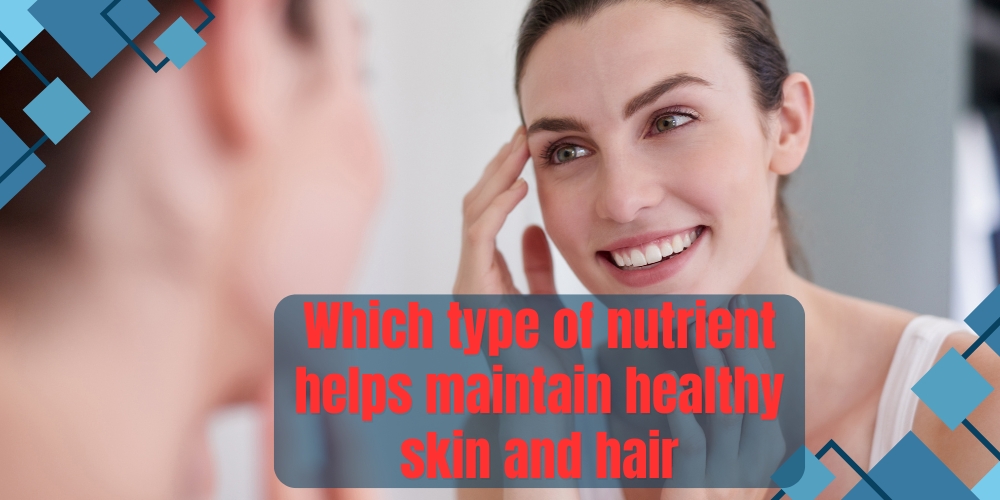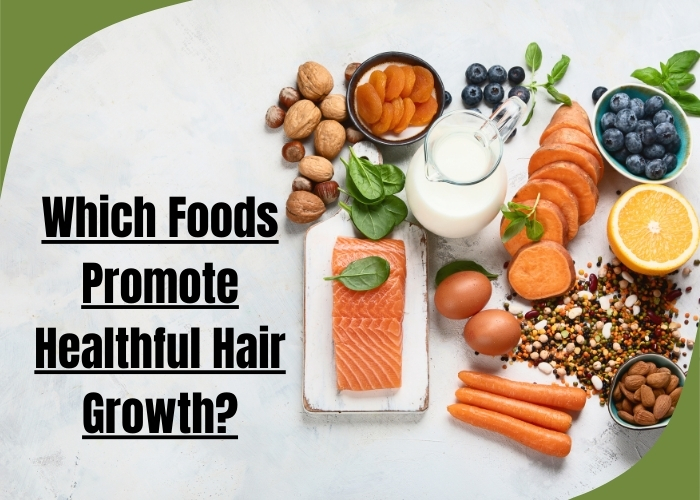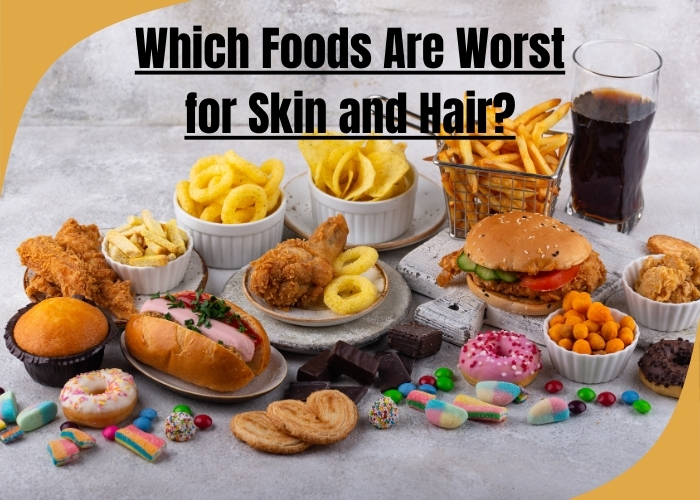Nutrition significantly impacts and affects a person’s general health and skin, nails, and hair. The quality and texture of skin and hair indicate an individual’s nutritional intake. A good diet aids in the battle against many skin and hair-related problems. Specific nutrient components can promote hair growth and delay skin aging. In addition to protecting hair from UV rays, hair works as heat insulation. Evidence supports the idea that vitamins and minerals can promote hair development. The largest organ in the body, the skin, is a barrier against various pathogens.Let’s talk about ,Which type of nutrient helps maintain healthy skin & hair.
Additionally, it safeguards the body’s fluid balance. As a result, taking proper care of the skin is crucial. Let’s discuss which type of nutrient helps maintain healthy skin & hair.
Skin:
Your skin is your largest organ, and because it’s visible, you can see problems early on and often tell what’s wrong with it just by glancing in the mirror.
The nutrients in plant-based diets improve the skin’s barrier function and help it look like healthy skin. Even though further research is required to validate these advantages, it is beneficial for the body and skin to consume a diet high in fruits, vegetables, whole grains, and healthy fats.
Hair:
It benefits your skin and also benefits your hair. The Mediterranean diet, which is high in raw veggies and fresh herbs, together with a diet that includes isoflavone-rich soy, may help people with alopecia appear to have healthy hair and encourage hair development, according to research from 24 articles published in the journal Skin Appendage Disorders.
Which type of nutrient helps maintain healthy skin & hair:
Several nutrients are essential for keeping skin and hair healthy. Among them are:
Vitamins
Vitamin A: Aids in the upkeep and restoration of skin tissue. By lowering sebum production, it also aids in the reduction of acne.
Vitamin C: Requires collagen formation, which keeps skin youthful and firm. Additionally, it contains antioxidant qualities that shield the skin from harm.
As an antioxidant, vitamin E helps shield the skin from UV rays and oxidative stress.
Vitamin D: Promotes skin cells’ growth, repair, and metabolism. Involved in the immune system, it can also aid in treating skin conditions, including psoriasis and acne.
B vitamins (biotin, niacin, and B6): The function of biotin (B7) in preserving healthy hair and nails is particularly well-known. B6 aids in hair growth, and niacin (B3) preserves the skin’s moisture barrier to promote skin health.
Minerals:
Zinc: Helps to regenerate skin cells and repair damaged tissues. Not only that but also Its anti-inflammatory qualities also make it helpful for acne management.
Selenium: Preserves skin suppleness and aids in shielding the skin from sun damage.
Vital Fatty Acids:
The skin’s lipid barrier is maintained by omega-3 and omega-6 fatty acids, which also keep the skin moisturized and plump. They also aid in the reduction of inflammation in psoriasis and eczema.
Proteins:
Collagen: Collagen gives skin and hair structure and strength. It is a significant component of both. Skin elasticity and hair strength can be supported by consuming foods or supplements high in collagen. The structural protein known as keratin is found in hair, skin, and nails. Maintaining a sufficient protein intake aids in the body’s keratin production.
Oxidants
Flavonoids and polyphenols: These antioxidants, which may be found in fruits, vegetables, and teas, can both protect the skin from oxidative stress and enhance its general appearance.
Drinking plenty of water
Aqua: Sustaining the skin’s suppleness and averting dryness requires adequate hydration. Water consumption keeps skin cells moisturised and in good condition.
Sources of These Nutrients Through Diet:
Vitamin A: Leafy greens such as spinach, carrots, sweet potatoes, and others.
Vitamin C: Broccoli, bell peppers, strawberries, and citrus foods.
Nuts, seeds, avocado, spinach, and spinach contain vitamin E.
Sunlight, fatty fish, fortified dairy products, and supplements are good sources of vitamin D.
Sources of B vitamins: meat, eggs, whole grains, nuts, and seeds.
Contains zinc: meat, seafood, beans, seeds, and nuts.
Whole grains, fish, eggs, and Brazil nuts are good sources of selenium.
Walnuts, flaxseeds, chia seeds, and fatty fish are sources of omega-3 fatty acids.
Collagen: Collagen supplements, chicken skin, and bone broth.
Which Foods Promote Healthful Hair Growth?
Eggs: Rich in protein and biotin, which supports healthy hair development, eggs are an excellent food source.
Berries: Rich in several antioxidants, berries promote the growth of hair.
Spinach: Rich in vitamins A and C, spinach encourages hair growth.
Sweet potatoes: Their high vitamin A content increases sebum production, encouraging hair growth.
Fish: Rich in omega-3 fatty acids, which promote hair growth and density.
What Part Does Diet Play in Healthy Hair?
Hair continues to develop continuously. As the follicles produce hair from the nourishment in the body, it is being replaced. Hair follicle quality and growth are influenced by nutrition and diet. According to the American Academy of Dermatology, a person’s daily hair loss ranges from fifty to one thousand hair strands, replenished by new hair follicle growth. Minerals, vitamins, and protein are dietary components that are necessary for healthy hair development.
The function of nutrition in preserving hair health is discussed below.
One of the leading food components needed for good hair development is protein. Keratin protein is the type of protein found in hair strands. It stimulates the hair’s growth phase.
Iron: Iron keeps hair in better condition. Iron deficiency causes hair loss and weak, brittle hair.
Vitamin D: Vitamin D is essential for both the growth and cycle of hair. It increases a person’s rate of hair growth.
Which Foods Are Worst for Skin and Hair?
Keep an eye out for these food items that steal attractiveness, and avoid adding them to your shopping cart. Fill your shopping cart after deciding which vitamin will assist your skin, hair, and nail growth.
Booze. Drinking causes the body, skin, hair, and nails to become dehydrated. A paper published in Clinics in Dermatology has linked excessive alcohol use to changes in the skin, hair, and nails.
Processed foods: Processed foods typically have excessive fat, sugar, and salt content. To maintain younger-looking skin, hair, and nails, limit their intake in your diet.
Sweetened beverages. Drinking sugar-filled beverages and eating sugar-filled foods can make your skin appear and feel older. A study published in Clinics in Dermatology found a connection between high blood sugar levels and aging skin.
Eating a well-balanced diet facilitates maintaining healthy skin.For a nutritious diet that can strengthen your skin, nails, and hair, rely on fresh foods high in vitamins and nutrients.
Conclusion:
An individual’s diet influences skin and microeconomics. Numerous macro- and micronutrients support healthy hair development and texture improvement in the skin. It nourishes the body from the inside out, giving it a beautiful shine. Healthy habits ought to be a constant part of our lives. Foods that are highly processed and sweetened ought to be avoided. A particular diet can be used to incorporate specialised nourishment.



